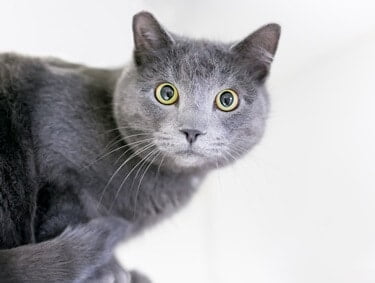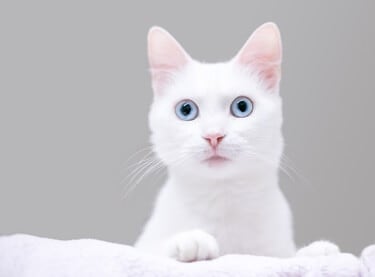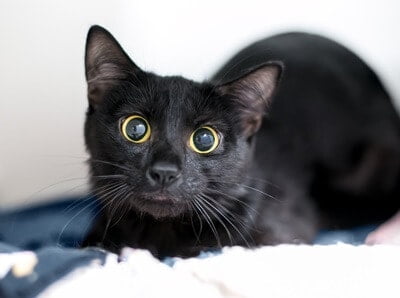Cats dilate their pupils to improve their vision. Wide eyes enable cats to absorb more light, which is highly beneficial in dim lighting. Also, cats’ pupils dilate when excited, afraid, or hurt. However, this should never last longer than a couple of hours, eventually going away on its own.
Constant dilation of cats’ eyes can signify pain, overstimulation, or age-related atrophy. Many health concerns are associated with dilated pupils, including feline leukemia, toxicity, dysautonomia, and tumors. Cats’ eyes should dilate periodically, so it’s concerning if the pupils never contract.
If this ever happens, your cat’s eyesight could be at risk. Diagnosing and treating the underlying medical issue is key to maintaining good feline eye health.
Why Do Cat’s Eyes Dilate?
Most commonly, cats widen their eyes to see more clearly in dim conditions.
Light enters cats’ eyes through the pupils—the more light, the better they can see. So, a cat may seem to have constantly dilated pupils at night.
According to Brain Research, cats’ pupils expand up to 10 times wider than human pupils. Dilated pupils are known as mydriasis. If the lighting isn’t dim, the cat is widening its pupils for a different reason.
The explanations for this behavior include the following:
- Shocked or startled
- Excited
- Pain
- Unwell
- Eye trauma
If the dilation is temporary, it’s not a concern. For example, your cat could be in pain because somebody stepped on its tail. Also, your cat will quickly recover from being startled by a loud noise.
My Cat’s Eyes Are Constantly Dilated
Cats’ eyes should remain in a neutral state for the majority of the day.
Dilation of the eyes should be an exception, not the general rule. Cats’ eyes could remain dilated throughout the day and night for medical or psychological reasons.
Common explanations include:
- Blindness
- Generalized anxiety disorder
- Overstimulation
- Chronic or constant pain
- Consumption of toxins
- Hypertension (high blood pressure)
- Dysautonomia (Key-Gaskell Syndrome or Feline Dilated Pupil Syndrome)
- Side effects of medication
- Age-related atrophy of the iris
- Ocular tumors

Loss of Sight
If a cat’s losing its sight, its eyes will remain dilated as it’s attempting to absorb light to aid its vision.
Senior cats start to lose their sight, especially purebred cats. The blindness could be temporary or permanent.
Other signs that a cat is going blind include:
- Clumsiness and bumping into unfamiliar objects.
- Walking with whiskers low to the ground.
- Apprehension when jumping and climbing.
- Easily startled by sudden noises.
- Difficulty locating a water source.
- Excessive vocalization, growing distressed when you do not respond.
You can test your cat’s eyesight with this simple test:
Wave a ball of wool before the cat’s eyes. Don’t swing the wool close enough for the cat’s whiskers to sense it. If your cat can see, its hunting instincts will be initiated, while a blind cat will remain indifferent.
If your cat has lost its sight, the problem may be temporary. Kidney issues, toxicity, feline herpesvirus, and eye infections can cause short-term blindness.
If your cat is permanently losing sight, it’ll learn to cope. Eyesight is widely considered a cat’s least effective sense, so cats rely more on hearing, smell, and touch.
The following adjustments will be beneficial:
- Don’t rearrange the furniture.
- Provide obstacle-free paths to food, water, and litter.
- Announce your presence when entering a room.
- Speak to your cat regularly as your voice will offer comfort.
- Avoid loud, sudden noises.
Tension and Anxiety
When a cat is frightened, its eyes will remain wide and dilated.
If you notice wide-eyed fear in your cat, you’ll need to identify the trigger. This could range from a loud noise to the presence of a stranger. Also, cats will frequently flee and hide when startled. When the cat re-emerges from hiding, its eyes should no longer be dilated.
A cat that roams with dilated eyes seems continuously on edge. The cat fears danger at every turn. Health problems can follow prolonged periods of stress and anxiety, and the cat may become more aggressive.
Discover why the cat’s stressed and make adjustments. Most often, cats are stressed because something in their routine has changed. Maintain a strict, reliable routine to keep your cat happy and contented.
Some cats are always nervous, so use calming scents and sounds and herbal remedies to calm your cat.
Overstimulation
Cats grow excited due to sights, sounds, and smells. If it doesn’t calm down, it’ll grow over-excited, placing a strain on its heart.
Overstimulation is common when a cat finds itself in a new environment, as the cat will grow excitable while exploring new surroundings. If you notice a new cat has constantly dilated eyes, guide it to a single room.
Once the cat has had a chance to calm down, its pupils will normalize.
Chronic Pain
Cats are adept at hiding pain. For example, a cat that cannot walk without limping may not walk at all.
Cats cannot hide all pain symptoms and constantly dilated cats’ eyes are a giveaway. If your cat’s eyes are wide, look out for other symptoms of discomfort.
These include the following:
- Loss of appetite
- Lethargy
- Lack of interest in grooming
- Uncharacteristic aggression
- Refusing petting and handling
Make your cat comfortable and attempt to decipher the problem. Arthritis is an ever-present risk in senior cats, but this can be managed through massage, soft blankets, and nutritional supplements.
If the cat has foul breath, it may be experiencing dental pain. Most cats will eventually experience problems with their teeth, and dental issues can be connected to health complications.
Toxicity and Poisoning
A cat that has consumed toxins will have dilated eyes.
Aside from eye dilation, warning symptoms of toxicity include:
- Vomiting and diarrhea
- Trouble breathing
- Weakness and lethargy
- Muscle tremors
- Low body temperature
- Lethargy
- Reduced appetite
Toxicity is an ever-present risk because many home/yard items are toxic. If your cat has consumed toxins, these must be flushed from the body.
Hypertension
If a cat’s blood pressure is 160/80 mmHg, it has hypertension. Older cats are prone to high blood pressure, and the pain and discomfort associated with the condition can lead to dilated eyes.
Hypertension can be linked to another health concern, such as kidney or heart problems.
Aside from dilated eyes, other symptoms include:
- Excessive water consumption
- Blood in the urine
- Circling
- Bleeding from the nose
- Irregular heartbeat
- Muscle tremors
- Seizures
A cat that takes medication for hypertension will experience a reduction in symptoms but may still have dilated eyes. According to the Archives of Pharmacology, mydriasis is a side effect of Clonidine, a drug used to treat hypertension in cats.
Dysautonomia
Dysautonomia, also known as Key-Gaskell Syndrome or Feline Dilated Pupil Syndrome, attacks a cat’s automatic nervous system (ANS). This means that the cat has no control over its basic functions.
As an aggressive and degenerative condition, dysautonomia must be treated urgently. Constantly dilated eyes are the easiest symptom to recognize.
Other concerns include:
- Digestive issues
- Dry nose
- Lack of appetite and associated weight loss
- Regurgitation of food
- Protrusion of the eyelid
- Slow heart rate
- Low body temperature
- Inability to urinate or defecate
The Journal of Feline Medicine and Surgery describes an enlarged esophagus and swollen abdomen as the most common warning signs. Be mindful of a cat that vomits regularly or regurgitates its food.
Iris Atrophy
As a cat grows older, its iris’ starts to thin. Once the iris degenerates, your cat will become unable to contract its pupils anymore.
Iris atrophy is irreversible, but the cat won’t be in pain. It may become sensitive to bright light, so it’ll squint and hide in dark corners. Provide an escape route from illuminated areas.
Ocular Cancers and Tumors
When a cat develops a tumor behind the eye, it’ll often be malignant. This tumor can spread throughout a cat’s body which will be painful for your cat, leading to dilated pupils.
Other symptoms include the following:
- Discoloration
- Inflammation
- Glaucoma
- Discharge from the eye
- Misshapen iris
- Cloudy eyes
The diagnosis of eye tumors is completed using an ophthalmoscope. Then, biopsies will be taken to determine the severity of the tumor.
If the tumor is small, it may be treatable by laser. However, eye removal will usually be necessary to prevent the tumor from spreading.
Only One of My Cat’s Eyes is Dilated
Mismatched pupil sizes in cats mean your cat has anisocoria.
Sometimes, one pupil is smaller and permanently narrowed. It’s more common for one eye to be permanently dilated, so your cat may keep one eye closed.
Senior cats are prone to developing anisocoria, which is a symptom of another problem.
Common explanations include the following:
- Physical trauma
- Glaucoma
- Ulcers on the cornea
- Disease and infection within the eye
- Feline spastic pupil syndrome
As with dual-dilated eyes, anisocoria is concerning if it’s prolonged. Trauma, such as being poked in the eye, can cause temporary anisocoria, but this shouldn’t last longer than a few hours.
If the anisocoria lasts over 24 hours, your cat should be checked over by a vet.

Eye Diseases, Ulcers, And Infections
Cats can be prone to eye infections that can be bacterial or due to irritation or allergies.
A basic eye infection can be treated with antibacterial eye drops. If successful, your cat’s eyes will return to an equal size.
Senior cats often develop ulcers on the eye, which can be removed by a vet using a scalpel. Ulcers are painful but treatable.
A problem like glaucoma is more concerning as it places pressure on your cat’s optic nerves. Left untreated, this could cost your cat its sight.
Feline Spastic Pupil Syndrome
This condition causes anisocoria to move from one eye to another.
Feline spastic pupil syndrome is usually a symptom of feline leukemia (FeLV). If a cat’s mismatched eyes vary regularly, it likely has FeLV.
Feline leukemia is a contagious condition passed on through blood, saliva, or waste. If recurrent, the condition is life-threatening. FeLV is a vaccine offered to all kittens and adult cats.
Additional symptoms include:
- High fever
- Trouble breathing
- Loss of appetite and weight loss
- Pale and discolored gums
- Sterility
- Lethargy
- Poor quality coat
There’s no cure for FeLV, which is why vaccination is vital. If your cat is diagnosed with FeLV, it should be kept indoors. Once infected, it could catch the virus again, so mixing with other cats increases the risk.
Cats have very expressive eyes, so you’ll regularly see a cat with dilated eyes when excited. However, a cat’s eyes should never be dilated constantly.


Hello, Richard: I have had my cat Harry for the past year and a half. The people next door were moving away and said they could not take Harry with them. I said “yes” when they asked if I wanted to take him. They told me he was between 12 and 13 years old. I have grown very fond of Harry. Things were going well until two weeks ago when he began to sneeze a lot and produce yellow mucus. Vet a week ago gave Harry covena and he improved right away. Blood test reveals possible cancer. For the past two days, Harry’s eye pupils dilated at night, all night. His first night of blindness caused him great distress. Why is this happening? What is wrong? Harry, 48 hours later, has gotten used to this night time blindness, but I worry what is going on and what happens next. Thank you, Marlise